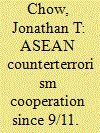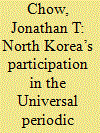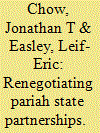| Srl | Item |
| 1 |
ID:
061899


|
|
|
|
|
| Publication |
Mar-Apr 2005.
|
|
|
|
|
|
|
|
|
|
|
|
|
|
|
|
| 2 |
ID:
151997


|
|
|
|
|
| Summary/Abstract |
North Korea’s participation in the UNHRC’s Universal Periodic Review (UPR)—a peer review in which states make recommendations to one another for improving human rights implementation—is a notable exception to its rejection of other human rights mechanisms. What explains North Korea’s willing participation in the UPR? This essay analyses North Korea’s participation in the first (2008–11) and second (2012–15) UPR cycles through its written submissions, responses to recommendations, and recommendations to other states. It finds that North Korea has consistently accepted weak recommendations, rejected more specific policy changes, and implemented accepted recommendations on a limited basis, allowing it to claim compliance with human rights at minimal cost. The UPR’s reliance on states’ self-reports and its inability to adjudicate competing factual claims allow North Korea to reject claims of egregious abuses, openly advocate for a radically state-centric vision of human rights, and challenge the legitimacy of human rights mechanisms like the Commission of Inquiry and Special Rapporteur while building support from other states with similar views. Notably, the Commission of Inquiry appears to have motivated North Korea to increase its cooperation with the UPR, demonstrating that the UPR complements but cannot replace other UN human rights mechanisms.
|
|
|
|
|
|
|
|
|
|
|
|
|
|
|
|
| 3 |
ID:
168441


|
|
|
|
|
| Summary/Abstract |
Pariah status for violating international norms over decades increased Myanmar and North Korea’s dependence on China. Myanmar’s post-2010 reforms sought to reduce international sanctions and diversify diplomatic relations. North Korea pursued a diplomatic offensive after the 2018 Winter Olympics, but only after declaring itself a nuclear state. Why, despite both states’ politically unsustainable dependence on China, did Myanmar and North Korea pursue different strategies for renegotiating reliance? Unlike the Kim regime, Myanmar’s junta could step back from power while protecting its interests. Pro-democracy leader Aung San Suu Kyi was a credible signaler of reforms, providing Western governments political cover to reduce sanctions. Myanmar used liberalizing reforms to address internal threats, whereas North Korea utilizes external threats for regime legitimacy. The theoretical underpinnings and empirical trajectories of these distinctions–as well as Myanmar’s backsliding on human rights–explain why reducing reliance on China may prove more difficult than shedding pariah status.
|
|
|
|
|
|
|
|
|
|
|
|
|
|
|
|